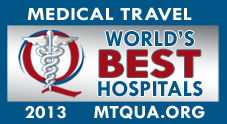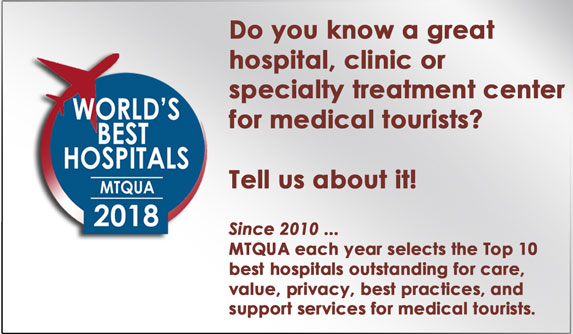
A medical traveler should be aware that safety and quality in any hospital – no matter how good it is, and what country it’s in – is not guaranteed. We strongly urge all medical travelers to seriously consider using the services of an experienced, professional medical travel company that offers a full range of care management services on the ground. Any medical travel company, doctor, clinic or hospital that is Medical Travel Certified by MTQUA supports total care management for medical tourists.
Read the press release.
Nominate a hospital as a World’s Best Hospital for Medical Tourists™.
Criteria for selection.
1. Prince Court Medical Center, Kuala Lumpur, Malaysia
Prince Court Medical Center provides excellent surgery options for medical travelers. Special services include a sophisticated burn unit, an In Vitro Fertility department with multiple fetal monitoring. A senior manager coordinates all international patient and medical tourist services and procedures, assuring medical tourists that coordination of care that meets the needs of the medical traveler is a priority. Read more about what makes Prince Court Medical Center great.
2. Asklepios Klinik Barmbek, Hamburg, Germany
Asklepios Klinik Barmbeck hired a new medical tourism manager to improve and support organizational response for medical tourists. It has increased its efforts to meet the needs of medical travelers in their home countries. Newly revised and updated medical tourism handbooks in Arabic and Russian as well as English provide extensive information about the hospital’s services. This hospital is of particular value for medical tourists who need treatment beyond the scope of their top facilities at home. It partners with innovative medical technology companies from Germany to test the most modern medical equipment before it is released worldwide. Asklepios Group is the largest private hospital operator in Europe.
3. Clemenceau Medical Center, Beirut, Lebanon
Clemenceau has ties with Johns Hopkins Hospital in Baltimore and stands out as perhaps the leading hospital in the Middle East. This past year, CMC adopted “Six International Patient Safety Goals”, increased the use of encryption protected passwords to access patient electronic records, and introduced multidisciplinary rounds to better coordinate medical treatment for patients. It conducts an ongoing review of international patient trouble spots such as billings and ethical dilemmas in care.
4. Fortis Hospital, Bangalore, India
This Fortis Hospital, formerly Wockhardt Hospital, provides excellent surgery options for medical travelers seeking orthopedic procedures including hip resurfacing and replacement. It works closely with some US-based medical travel agents for follow up care and services of American patients once they return home.
5. Wooridul Spine Hospital, Seoul, Korea
This unique hospital is a world leader in medical treatment of the spine. Wooridul’s influence and prestige has spread worldwide through its doctors and its joint ventures with hospitals in Asia and Europe. It is the only specialized hospital on this Top 10 list.
6. Bumrungrad International, Bangkok, Thailand
The most well-known hospital for medical tourists, Bumrungrad has been taking foreign patients for 20 years. It has invested heavily in integration of medical records, pharmacy, labs and other hospital departments into a state-of-the-art electronic environment. Its focus on technology and its American style of management carry over to the Bumrungrad website, which is a model for other international hospitals. The hospital operates a network of exclusive representatives.
7. Anadolu Medical Center, Istanbul, Turkey
Istanbul is home to several excellent hospitals. Anadolu offers a very high standard of treatment and care, and seems to understand the needs of the medical traveler. It has an international focus, with multilingual doctors and nurses, and a keen awareness of the services and support systems a medical traveler should have.
8. Bangkok Hospital Medical Center, Bangkok, Thailand
The flagship of the largest private hospital chain in Thailand, Bangkok Hospital Medical Center meets several of the MTQUA criteria that make it one of the World’s Best Hospitals for Medical Tourists™. Individual hospitals of the medical center in Bangkok include the distinguished Bangkok Heart Hospital, Bangkok International Hospital, and Wattanosoth Cancer Hospital. The hospital lists qualified medical travel companies on its website and operates a network of representatives.
9. Gleneagles Hospital, Singapore
The Parkway Hospital Group may well be the standard bearer for private hospital care in Singapore, and Gleneagles Hospital is its flagship. The Parkway group owns and operates hospitals throughout Asia.
10. Asian Heart Institute, Mumbai, India
It is one of the few centers in the world doing nearly 100% bypass surgeries on a beating heart and with
a very significant percentage using total arterial grafting. The hospital boasts the lowest surgical
mortality rates in the world with 0.26% in isolated bypass surgeries & an overall mortality of 0.8%. Some of
the most challenging and rare cases are performed regularly at AHI.
Special mention goes to these excellent hospitals for medical tourists that ranked very highly in our considerations for the Top 10 list for 2013.
Malaysia: Sime Darby Medical Centre Subang Jaya, Kuala Lumpur
Mexico: Christus Muguerza Super Specialty Hospital, Monterrey
South Africa: Mediclinic Morningside, Johannesburg
Spain: Barcelona Medical Centre, Barcelona


 MTQUA annually publishes the list of the top 10 World’s Best Hospitals for Medical Tourists™. We choose to recognize the hospitals around the world that best meet
MTQUA annually publishes the list of the top 10 World’s Best Hospitals for Medical Tourists™. We choose to recognize the hospitals around the world that best meet  >
>